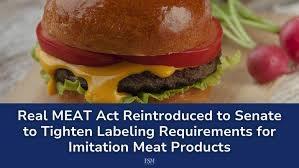 Senator Deb Fischer (R-NE) has reintroduced the Real Marketing of Edible Artificials Truthfully Act, colloquially referred to as the Real MEAT Act. The purpose of the intended legislation is to clearly define beef and pork for the purposes of labeling and to require the term “imitation” on packaging of alternative products.
Senator Deb Fischer (R-NE) has reintroduced the Real Marketing of Edible Artificials Truthfully Act, colloquially referred to as the Real MEAT Act. The purpose of the intended legislation is to clearly define beef and pork for the purposes of labeling and to require the term “imitation” on packaging of alternative products.
This is a classic case of ‘feel-good” legislation pandering to a specific constituency and gaining financial support from the National Cattlemen’s Beef Association and similar organizations. The justification for the legislation according to Senator Fischer is to avoid confusion among consumers. There is no evidence that consumers, irrespective of their level of literacy, cannot distinguish between p lant-based meat substitutes and animal-derived meat. If avoiding confusion is the major justification, perhaps the proposed legislation should go beyond labeling and enforce separation of real meat and substitutes at point of sale.
lant-based meat substitutes and animal-derived meat. If avoiding confusion is the major justification, perhaps the proposed legislation should go beyond labeling and enforce separation of real meat and substitutes at point of sale.
When subjected to legal challenges, most of the state-enacted labeling laws have been declared unconstitutional. With so many major fiscal and social issues facing Congress, the Real MEAT Act would appear to be Congressional theatre rather than productive legislation. The need for legislation to enforce labeling is probably moot given the declining sales of meat substitutes based on high price and inferior quality compared to real meat.